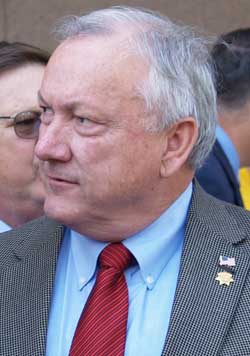BY LINDA BENTLEY | jUNE 1, 2011
SCOTUS upholds Legal Arizona Workers Act
‘President Obama is more interested in mocking those of us who want our border secure than protecting American citizens’
WASHINGTON – On May 26, the Supreme Court of the United States upheld the opinion of the U.S. District Court, affirmed by the Ninth Circuit Court of Appeals, finding the plain language of the Immigration Reform and Control Act of 1986 (IRCA) preemption clause did not invalidate the Legal Arizona Workers Act (LAWA) because the law did no more than impose licensing conditions on businesses operating within the state.
Nor was the state law preempted with respect to E-Verify, the district court concluded, stating although Congress had made the program voluntary at the national level, it expressed no intent to prevent states from mandating participation.
The LAWA, which went into effect January 1, 2008, prohibits businesses from knowingly or intentionally hiring an “unauthorized alien” after Dec. 31, 2007. The law also requires Arizona employers to use E-Verify, a free web-based service offered by the Department of Homeland Security, to verify employment eligibility of all new employees hired after Dec. 31, 2007.
In December 2007, the Arizona Contractors Association, Arizona Employers for Immigration Reform, U.S. Chamber of Commerce, Arizona Chamber of Commerce, Arizona Hispanic Chamber of Commerce, and a host of other nonprofit corporations and associations representing businesses that are notorious for employing illegal aliens, filed a complaint against the law, seeking a declaratory judgment, as well as a preliminary and permanent injunction enjoining all of Arizona’s county attorneys and the attorney general from enforcing the law.
Plaintiffs claimed the law violates the U.S. and Arizona constitutions, deprives plaintiffs and others of property without due process of law, regulates and interferes with interstate commerce, violates the supremacy clause and violates the separation of powers doctrine of the Arizona Constitution.
However, U.S. District Court Judge Neil Wake disagreed.
Wake also noted complying with E-Verify would provide benefits for plaintiffs in that its use effectively ensures they will be immune from licensing sanction proceedings.
Discounting the “expert reports” submitted by the plaintiffs, which he said “inappropriately attempted to give weight to the value of benefits produced by unauthorized alien labor,” Wake stated, “The beneficiaries chosen identically by federal and Arizona law prevail over all who benefit from unauthorized alien labor. They are the authorized workers in the United States who compete with unauthorized aliens.”
Wake also said there was good reason to believe the Act would “significantly stem the increase and reduce the absolute number of unauthorized alien workers in Arizona” noting it reduces the employers’ incentive to discriminate against foreign-appearing applicants, as E-Verify will assure “they are safe in retaining or terminating any new hire.”
In denying the plaintiff’s injunction pending appeal, Wake stated, “The court finds as a fact that the cost of complying with E-Verify … is far less than the wage depression to the poorest Arizona workers from unauthorized alien labor.”
Chief Justice John Roberts, who wrote the majority opinion, noted, “While the IRCA prohibits states from imposing ‘civil or criminal sanctions’ on those who employ unauthorized aliens, it preserves state authority to impose sanctions “through licensing and similar laws.”
Roberts called the plaintiffs’ argument that the Arizona law is not a “licensing” law because rather than grant licenses, it operates only to suspend and revoke, “without basis in law, fact or logic.”
He stated, “Arizona’s procedures simply implement the sanctions that Congress expressly allowed Arizona to pursue through licensing laws. Given that Congress specifically preserved such authority for the states, it stands to reason that Congress did not intend to prevent the States from using appropriate tools to exercise that authority.”
Roberts said Arizona even “went the extra mile” in ensuring its law closely tracked IRCA’s provisions in all material respects, including the adoption of the federal definition of who qualifies as an “unauthorized alien.”
Knocking down assertions the law constituted the “business death penalty,” Roberts stated, “All that is required to avoid sanctions under the Legal Arizona Workers Act is to refrain from knowingly or intentionally violating the employment law … The most rational path for employers is to obey the law—both the law barring the employment of unauthorized aliens and the law prohibiting discrimination—and there is no reason to suppose that Arizona employers will choose not to do so.”
Responding to plaintiffs’ argument that if the other 49 states followed Arizona’s lead in mandating the use of E-verify, the “state mandated drain on federal resources would overwhelm the federal system and render it completely ineffective …” Roberts said, “Whatever the legal significance of that argument, the United States does not agree with the factual premise. According to the Department of Home-land Security, “The E-Verify system can accommodate the increased use that the Arizona statute and existing similar laws would create.”
In its amicus brief, the U.S. government stated it encourages participation in the E-Verify program as the most accurate means available of verifying employment eligibility.
Justices Stephen Bryer, Ruth Bader Ginsburg and Sonia Sotomayor dissented, while Justice Elena Kagan recused herself.
Breyer, in his dissenting opinion, claimed employers will “hesitate to hire those they fear will turn out to lack the right to work in the United States.”
 A jubilant Sen. Russell Pearce (r), R-Dist. 18, who authored the law, said, “We’ve gone to court six times and won six times … finally at the U.S. Supreme Court.”
A jubilant Sen. Russell Pearce (r), R-Dist. 18, who authored the law, said, “We’ve gone to court six times and won six times … finally at the U.S. Supreme Court.”
Right after the law was passed, Pearce said the law would prove to be one of the most effective and non-discriminatory laws enacted anywhere in the country, one that will truly prevent illegal aliens from obtaining permanent employment in Arizona, while serving as an example of “real comprehensive immigration reform for the rest of our nation,” and called the disinformation campaign launched by the opposition one that “would have made a Soviet propagandist proud.”
Upon the announcement of Thursday’s decision, the Anti-Defamation League (ADL) issued a press release expressing its disappointment in the Supreme Court’s decision to uphold the LAWA, claiming it “could have the consequences of fostering discrimination against immigrants.”
Roy Beck, executive director of NumbersUSA, which filed an amicus brief in support of the law, said the ruling gives a “huge boost to efforts to pass an E-Verify bill in Congress this summer.”
 Responding to the decision, Arizona Speaker of the House Andy Tobin (l), R-Dist. 1, said, “To our critics who say Arizona has no role in immigration issues, the Supreme Court has said otherwise. The Obama Administration was one of those critics and after four years of lawsuits and scare tactics, I’m glad to see we finally came out on top on this one. We’re grateful we can now give Arizonans confidence that we are continuing to implement the rule of law given that President Obama is more interested in mocking those of us who want our border secure than protecting American citizens.”
Responding to the decision, Arizona Speaker of the House Andy Tobin (l), R-Dist. 1, said, “To our critics who say Arizona has no role in immigration issues, the Supreme Court has said otherwise. The Obama Administration was one of those critics and after four years of lawsuits and scare tactics, I’m glad to see we finally came out on top on this one. We’re grateful we can now give Arizonans confidence that we are continuing to implement the rule of law given that President Obama is more interested in mocking those of us who want our border secure than protecting American citizens.”





